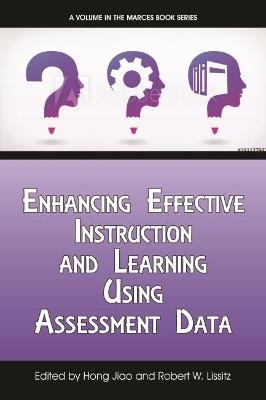
Enhancing Effective Instruction and Learning Using Assessment Data
Seiten
2022
Information Age Publishing (Verlag)
978-1-64802-626-3 (ISBN)
Information Age Publishing (Verlag)
978-1-64802-626-3 (ISBN)
Introduces theories and practices for using assessment data to enhance learning and instruction. Topics include reshaping the homework review process, iterative learning engineering, learning progressions, learning maps, score report designing, the use of psychosocial data, and the combination of adaptive testing and adaptive learning.
This book introduces theories and practices for using assessment data to enhance learning and instruction. Topics include reshaping the homework review process, iterative learning engineering, learning progressions, learning maps, score report designing, the use of psychosocial data, and the combination of adaptive testing and adaptive learning. In addition, studies proposing new methods and strategies, technical details about the collection and maintenance of process data, and examples illustrating proposed methods and software are included.
Chapters 1, 4, 6, 8, and 9 discuss how to make valid interpretations of results and achieve more efficient instructions from various sources of data. Chapters 3 and 7 propose and evaluate new methods to promote students' learning by using evidence-based iterative learning engineering and supporting the teachers' use of assessment data, respectively. Chapter 2 provides technical details on the collection, storage, and security protection of process data. Chapter 5 introduces software for automating some aspects of developmental education and the use of predictive modeling. Chapter 10 describes the barriers to using psychosocial data for formative assessment purposes. Chapter 11 describes a conceptual framework for adaptive learning and testing and gives an example of a functional learning and assessment system.
In summary, the book includes comprehensive perspectives of the recent development and challenges of using test data for formative assessment purposes. The chapters provide innovative theoretical frameworks, new perspectives on the use of data with technology, and how to build new methods based on existing theories. This book is a useful resource to researchers who are interested in using data and technology to inform decision making, facilitate instructional utility, and achieve better learning outcomes.
This book introduces theories and practices for using assessment data to enhance learning and instruction. Topics include reshaping the homework review process, iterative learning engineering, learning progressions, learning maps, score report designing, the use of psychosocial data, and the combination of adaptive testing and adaptive learning. In addition, studies proposing new methods and strategies, technical details about the collection and maintenance of process data, and examples illustrating proposed methods and software are included.
Chapters 1, 4, 6, 8, and 9 discuss how to make valid interpretations of results and achieve more efficient instructions from various sources of data. Chapters 3 and 7 propose and evaluate new methods to promote students' learning by using evidence-based iterative learning engineering and supporting the teachers' use of assessment data, respectively. Chapter 2 provides technical details on the collection, storage, and security protection of process data. Chapter 5 introduces software for automating some aspects of developmental education and the use of predictive modeling. Chapter 10 describes the barriers to using psychosocial data for formative assessment purposes. Chapter 11 describes a conceptual framework for adaptive learning and testing and gives an example of a functional learning and assessment system.
In summary, the book includes comprehensive perspectives of the recent development and challenges of using test data for formative assessment purposes. The chapters provide innovative theoretical frameworks, new perspectives on the use of data with technology, and how to build new methods based on existing theories. This book is a useful resource to researchers who are interested in using data and technology to inform decision making, facilitate instructional utility, and achieve better learning outcomes.
| Erscheinungsdatum | 01.12.2021 |
|---|---|
| Reihe/Serie | The MARCES Book Series |
| Verlagsort | Greenwich |
| Sprache | englisch |
| Maße | 156 x 234 mm |
| Gewicht | 333 g |
| Themenwelt | Informatik ► Datenbanken ► Data Warehouse / Data Mining |
| Sozialwissenschaften ► Pädagogik | |
| ISBN-10 | 1-64802-626-5 / 1648026265 |
| ISBN-13 | 978-1-64802-626-3 / 9781648026263 |
| Zustand | Neuware |
| Informationen gemäß Produktsicherheitsverordnung (GPSR) | |
| Haben Sie eine Frage zum Produkt? |
Mehr entdecken
aus dem Bereich
aus dem Bereich
Auswertung von Daten mit pandas, NumPy und IPython
Buch | Softcover (2023)
O'Reilly (Verlag)
44,90 €
Datenanalyse für Künstliche Intelligenz
Buch | Softcover (2024)
De Gruyter Oldenbourg (Verlag)
74,95 €


